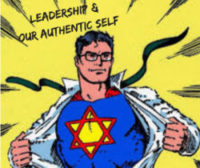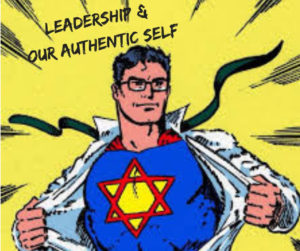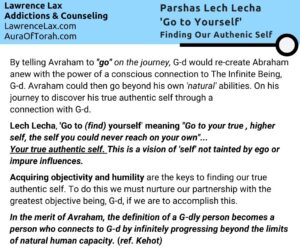
28 Oct Lech Lecha; Kiruv, Leadership and Our Authentic Self

Inspired by the teaching of Rav Yitzchak Ginsburgh and Rabbi Moshe Genuth
In this article we will be taking a look at the concept of kiruv (lit. to reach out, or outreach), and finding the unique authentic leader in ourselves. The root of these concepts is perhaps best found from the following two examples in Parshas Lech Lecha.
In this first example from Parshas Lech Lecha the Torah says… ‘And G-d said to Avraham Lech Lecha, go to [find] yourself’, G-d wanted Avraham to go and find his spiritual root and thus his unique authentic self as G-d intended him to be. For this to happen, Avraham had to journey through the action of ‘life’s journey’ that enabled him as it enables us to integrate and unify into our being the experiences of our mind (intellect) and our soul (emotive). As the Shema and its influence of unification teaches ‘… as I walk on my way’. Life’s journey is dynamic , not static.
Acquiring objectivity and humility are the keys to finding our true authentic self.
We must the build on our partnership with the greatest objective being, G-d, if we are to accomplish this.
In the second example we will look at is The Covenant of the Pieces. This was the first Covenant that Avraham entered with G-d. (The second covenant was the Covenant of Brit Milah). In performing the Covenant of the Pieces, Avraham had to make a sacrifice by cutting each of the following 4 types of animals in two pieces; 3 cattle, 3 sheep, 3 ram. The following were not cut, but released to fly; a turtle dove (young dove) and a dove (mature dove). This requires further explanation.
Each type of animal used in The Covenant of the Pieces is a metaphor for the historical phases of the Jewish World ; 3 periods of 2000 years each = 6000 years total to The Final Redemption. More specifically, the unity and elevating of these historic periods of the Jewish Land of Eretz Yisroel and the Jewish People, culminating as the Final Redemption with the coming of Mashiach.
The Covenant of the Pieces is a metaphor of the timeline of Jewish history ending with the Final Redemption.
As a greater G-d consciousness is brought in to ourselves and the world, we bring about greater unity; the cut pieces of the sacrifices of The Covenant of the Pieces become spiritually united, joined back together resulting in both a spiritual and physical transformation and rectification ultimately of the Jewish Land of Eretz Yisroel and the Jewish People. In the final stage of the process of this Tikun (rectification) , we employ the 2 doves which represents a Messianic time. The young turtle dove represents the child, and the more mature dove represents the mother.
The final stage is then a culmination of all the 3 stages, the bringing together in unity and harmony of the Jewish people, and uniting the child as the Jewish people, with the Mother as the the land of Eretz Yisroel in what will then be a rectified people in a rectified Land, … the Messianic era.
Avraham’s mission was to spread the understandings of Monotheism and righteous conduct. He was to enter the foreign land and bring to it Divine teachings, morality and righteous conduct. He was there to do ‘kiruv-outreach’. By his example it was obviously not limited to Jews as Avraham was the first Jew. The purpose of a Jew being a ‘light unto nations’ is to learn and live Torah values and to teach it to others. This means to also be a teacher of Righteous Conduct to non Jews. This is essential to Jewish, and world unity.
In our modern day Jewish life the Kiruv movement has been successful in bringing Jewish nishamas (souls) back to Jewish life and the study of Torah. Most of these efforts have been concentrated on the secular or detached Jew, inspiring such souls to return to Judaism giving Jews a renewed or never experienced look into their Jewish roots. But what I believe we have not kept current with, is the Kiruv that needs to be practiced by those individuals and communities that are already active in their roles as Jews. Some may call this type of reaching out to others ‘inreach’, but I may sometimes continue to use the term ‘outreach’ just the same, as it refers to reaching out beyond ones self to all Jews…. reaching out to a fellow Jew et al.
Where Noah was know as a man who ‘walked with G-d’, Avraham was know as a man who walked with and beyond Him as when he walke through the Covenant of the Pieces, Avraham also walked in front of G-d as a leader, our Patriarch . (A reason why Noah is not considered a Patriarch was that Noah walked with G-d as he was not a leader and does not merit being a Patriarch). Avraham took a proactive role in furthering the teachings of G-d’s Divine Way of living. It was Avraham’s ability to have a true understanding of ‘self’ that allowed him to to safely carry out his mission in the foreign land without compromising his true character and connection to G-d.
There seems to be a common practice that kiruv begins and ends with introducing someone to Yiddishkite; encouraging attendance to shul, and having Shabbos lunches. This approach and focus for the many disconnected Jews is a tremendously important aspect of kiruv…But there’s much more.
I believe there is a need for us to review our perspective on kiruv. We must look at kiruv or ‘outreach’ on a continuum to bring about transformation in ourselves and all our fellow Jews. We must learn to, and focus on, nurturing one another to become leaders respectively in our own lives. In this way, each person will become a leader in his own life, his family life and his community. In this way, all individuals will and must have the opportunity to fulfill his or her potential to find his or her own Torah, his or her own unique authentic self and pass on to others the gifts of G-d. It is integral to the healthy growth of the individual, the family and community. The Jewish People and the Final Redemption is dependent upon this principle.
Where there is lack of positive nurturing of growth at the community level there will follow a lack of individual character development. A problem we must identify and remedy is the establishment of Jewish communities that are intolerant to the non Jewish or ‘other’ Jewish Worlds. So deep is the problem that even the Baal Tshuva, many of whom got on the path to become observant ‘free thinkers’ fall pray to becoming ‘stiff necked’ by assimilating with such intolerant communities . Their understandings and practice of Judaism and there relationship to other Jews may become compromised. This treatment of others is no different from the times of Rabbi Akiva and the plague that struck 24,000 of his students.
We must keep in mind the distinction between learning Torah and Living Torah. We seem to have forgotten that having wisdom of the mind about Torah and mitzvoth is not the same as knowing as in having wisdom of mind and heart and doing and integrating Torah and mitzvoth. We seem to have forgotten a very important understanding; the mitzvot is a means to an end, not an end in of itself. The merit of the mitzvoth is in connecting our thoughts and our actions to serving G-d. Each and every single neshama (soul) holds the ability to ignite his or her own very important unique spark to bringing completeness and Tikun Olam (Rectification of the World).
There is sometimes an attraction of the Baal Tshuva to become assimilated with ‘established’ observant communities many of which are already entrenched in intolerant ways of dealing with other Jewish communities and the world. Such an association only contributes and often leads to a lack of true self identity and greater intolerance amongst Jewish community life itself. Isn’t that contrary to the point of Torah… Isn’t the point of learning and living Torah to find our true authentic selves, the authentic sense of self as Avraham does and as is G-d’s Will for all of us?
Aligning oneself with communities, leaders or people that lack authentic growth and Torah values can negatively influence one to acquire masks (or garments) causing ones character to not be his authentic self.A person taking this path would then be adding more layers (klipot, shells or garments). In fact a path such as this would be detrimental to ones being causing distance from the goal of authentic self actualization and ‘tikun olam’, the perfecting and rectifying oneself and the world. A path that doesn’t encourage unique personal growth in ones relationship with G-d is the path of another.
Kiruv (outreach) is something that should always be a primary concern by the individual or the community at all levels of observance.
We need to become leaders within ourselves. It is important to know who we choose as our leaders. There are those who may seem to be individuals with good equilibrium. They may have a strong foundation in Halachic and Torah ’information’. And there are those whose business and monetary success is seen as a benchmark for leadership. These are certainly good qualities to have but are not necessarily qualities of good leadership unless the person is in good balance. We must be cautious in choosing leadership. All too often individuals of accomplishment suffer from issues of pride, ego and arrogance (guyvah). Leadership chosen based on these negatively impacting qualities where a person’s equilibrium may be compromised can have damaging results.
Whether we are choosing our leaders, choosing our shul, choosing our community or choosing our garments, the pressure to conform to a compromised standard of ones authentic self is tremendous. We have powerful fears to conform based on our perceptions of personal acceptance. We are often confronted with fear, the fear of self actualization, a fear that keeps us from becoming ‘selem Elo- him’, in G-ds image …as HE intended each of us to be.
Issues in our lives that cause imbalance and unmanageability compromise our ability to be our true authentic self.
Where we may have experienced disappointment in what many may consider ‘pillars of community’, it is of no new insight that by accepting individuals as ‘pillars of community’ based on wealth , by how loud and forceful they can be, or by their Torah ‘academic knowledge’ (ie Torah of mind without heart) can be detrimental to a community and self. It is of no service to continue to elevate someone in or to a direction that will compromise their balance. For this reason Perkei Avot shares the understanding ‘do not overly praise someone’. Torah gives us clear understandings of what we ought to seek in our leadership.
We have a choice. In brief, a leader must posses the trait of Bitul (self nullification), they must be humble. Our leaders should have a balance of chesed (kindness) and gevurah (might), and must be able to understand the people they represents.
The criteria for accepting Mashiach as our leader requires that the Mashiach is unanimously accepted by all Jews as the Jewish King. We must therefore begin to work toward that unity keeping in mind the goal of the Final Redemption and Mashiach. I believe the need to cultivate leadership in the Jewish world is critical. The change needs to begin at he individual level with ourselves and then beyond.We must demand more of ourselves, of our community, and most certainly the Rabbis and leaders of our communities. We must take charge and be accountable for who we are as our unique authentic selves and for the leadership we choose.
I believe there needs to be awareness in dealing with one another in a more gentle and humble way… a more accepting and nurturing way. We must strive to elevate ourselves and each other. Kindness, compassion and humility are integral to kiruv, and kiruv must be done at ALL levels of observant and non observant Jewish communities.
As G-d said to Avraham ‘go to yourself’ . We must identify first our own personal journey, and then look to have an outward focus, a focus beyond ourselves, a focus that touches others in our homes and our communities.
We must understand that the Jewish mission is not just a personal mission, but a mission where each one of us as a unique individual holds an integral piece of a much bigger entity contributing and forming the completeness of the Jewish Nation. Our development as individuals is a ‘joint and several’ responsibility, all for one and one for all. We, the Jewish people are both individuals and a collective in G-ds eyes.We are each responsible for ourselves and each other. In order to achieve unity, we must individually and nationally have a strong foundation of Chesed (loving kindness) in balance with Gevurah (might), the result of which is Tiferet- beauty and harmony. This is accomplished with true leadership (Malchut-Kingship) by leaders who strive to be their authentic selves who encourage our unique and authentic relationships with G-d, and who representatives of the needs of the individuals and the communities. Our personal journey must include rectifying our midos (character) and transforming into our ‘unique authentic selves’ as Gods Will.
Emes is often translated as truth, but the more accurate translation is ‘G-d’s Reality’. We must fulfill the potential of the person that ‘G-d’s Reality’ wants each and every Jew to be, and in this understanding that it is our purpose to find our authentic self that G-d gave us the potential to be… and share that expression of G-dliness with others… kiruv.
By nurturing your true authentic self , you are bringing about a tikun-rectification, and bringing in to the world the purity of G-dines thereby hastening the Final Redemption and Mashiach. May he come now.
Leib Getzel (Lawrence) Lax
Addictions and Counseling (Hnrs)
